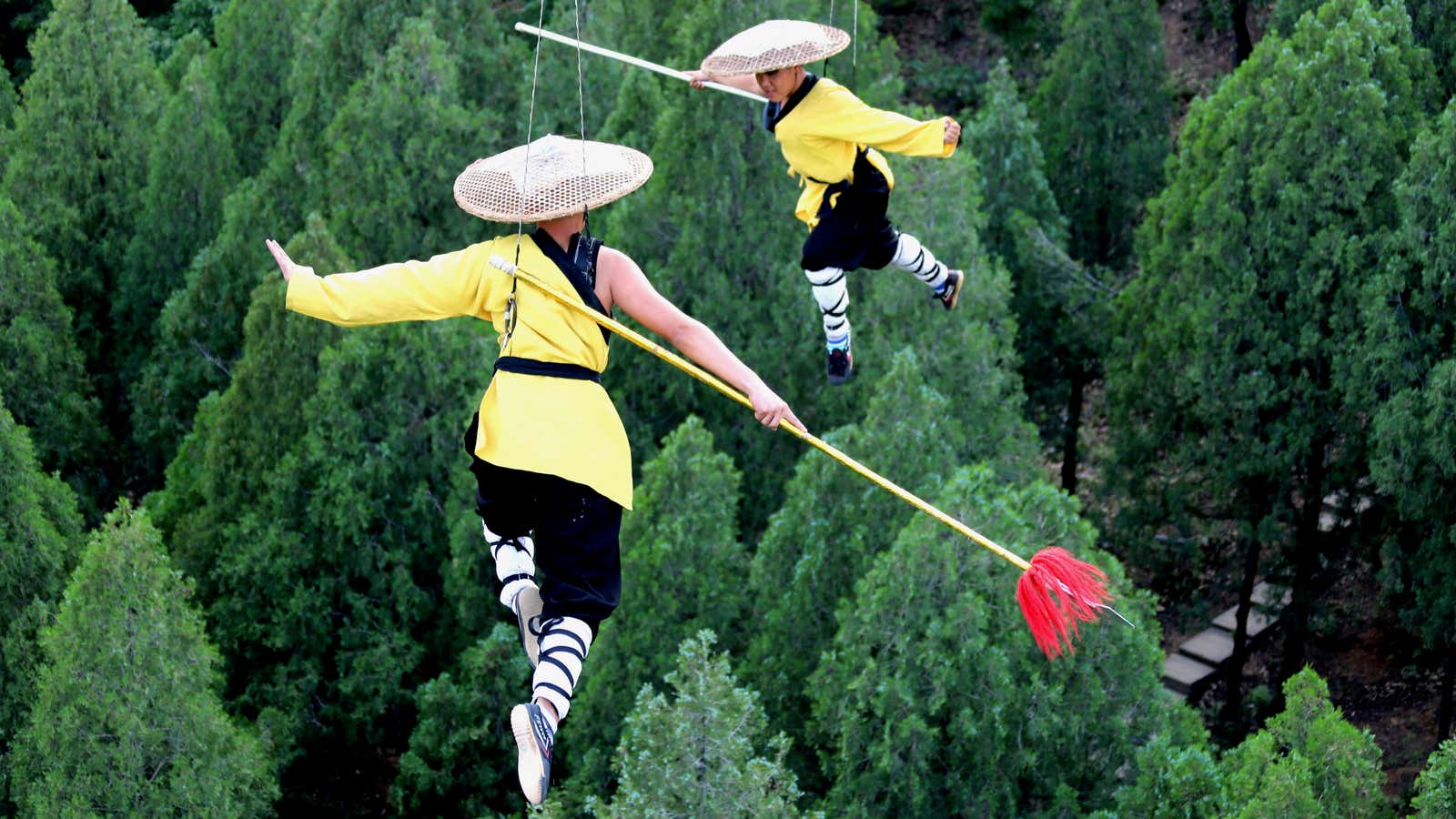Tradition and modernity are always at war, at least figuratively. In China, however, the battle between mixed martial arts and wushu—or kung fu—is now literal and political, pitting old-school grandmasters against a new style of scrapper. And the Chinese government doesn’t approve.
Xu Xiaodong, a mixed martial arts (MMA) fighter, riled traditionalists last year by defeating tai chi master Wei Lei, who claims mystical powers, in a brisk showdown that lasted just a few seconds. MMA is a postmodern fighting style, a pastiche of the world’s most effective forms and a sport that’s grown increasingly popular internationally. Xu was forced to go into hiding as the viral video of the fight inspired death threats by people who felt he was mocking tradition. A reprimand from the Chinese Wushu Association accused him of “suspected illegal actions that violate the morals of martial arts.”
The MMA fighter emerged from hiding and in April won another big showdown against kung fu master Ding Hao in less than two minutes. Again, the win did little to convince traditionalists of Xu’s loyalty to Chinese culture. On Nov. 5, Xu learned that local sporting authorities were barring him “indefinitely” from organizing tournaments for MMA fighters at his gym in Beijing.
Xu contends that he isn’t trying to undermine traditional fighting styles. Rather, he’s attempting to expose phony masters who make unfounded and outlandish claims about mystical powers. “A lot of people have been brainwashed by these fake kung fu masters,” Xu tells Time. “I’m trying to wake them up and let them know what real traditional kung fu actually is.”
Wushu was developed by Zen master Boddhidharma, who brought Buddhism from India to China around 500 AD, and developed in the remote forest mountain temple Shaolin. Its approach is shrouded in mysticism and myth. Some practitioners claim to be able to defy gravity, for example. Before his loss to Xu, the tai chi master Wei claimed to be able to control invisible force fields. These claims, and Shaolin temple’s mystical aura, were popularized in kung fu movies by Bruce Lee and, more recently, in films like Crouching Tiger, Hidden Dragon, as well as in the music of the Wu Tang Clan.
While some monks may possess spiritual powers, like self-mastery, not every alleged grandmaster is a magician. That’s why Xu’s view has support from Shi Yong Xin, abbot of the Shaolin temple.
Shi argues that kung fu and MMA are fundamentally different. Wushu is, at heart, a spiritual practice, though mastery involves rigorous physical training, so the abbot doesn’t consider the new style of fighting, or its proponent Xu, much of a threat. From his perspective, wushu is a method to cultivate inner peace.
Of Xu, Shi says, “He’s a good guy, even though he’s a totally amateur MMA fighter…a hundred people in Henan province alone” could defeat him. Still, according to the abbot, “Xu is doing the right thing by fighting fake kung fu.”He, too, believes that con artists promote a mythology about wushu and the monks of the Shaolin temple that in the long term detracts from traditional practices.
While the abbot and the new-school fighter may see eye to eye on debunking myths about magical abilities advanced by sham masters, the Chinese government isn’t thrilled with Xu. Kung fu is part of its “soft power” campaign to promote Chinese culture around the world. Hong Kong–born actor Jackie Chan, whose kung fu movies are widely adored, is a revered national figure who has been advising the Communist party on promotion since 2013. The politically agnostic Shaolin temple controversially flew the Chinese national flag for the first time to show support for the government this year.
The rise of MMA and the apparent ability of Xu to dominate in fights against old-school masters is problematic in the government’s view. Worldwide, love of king fu has been lucrative for China, bringing in billions of dollars from films and schools, while cultivating affection and respect in practitioners and admirers internationally.
Xu is undaunted, however, displaying the spirit of a true fighter. He’s vowed to continue fighting nonetheless, though he’s up against two formidable opponents—tradition and the state. It may be a losing proposition.
